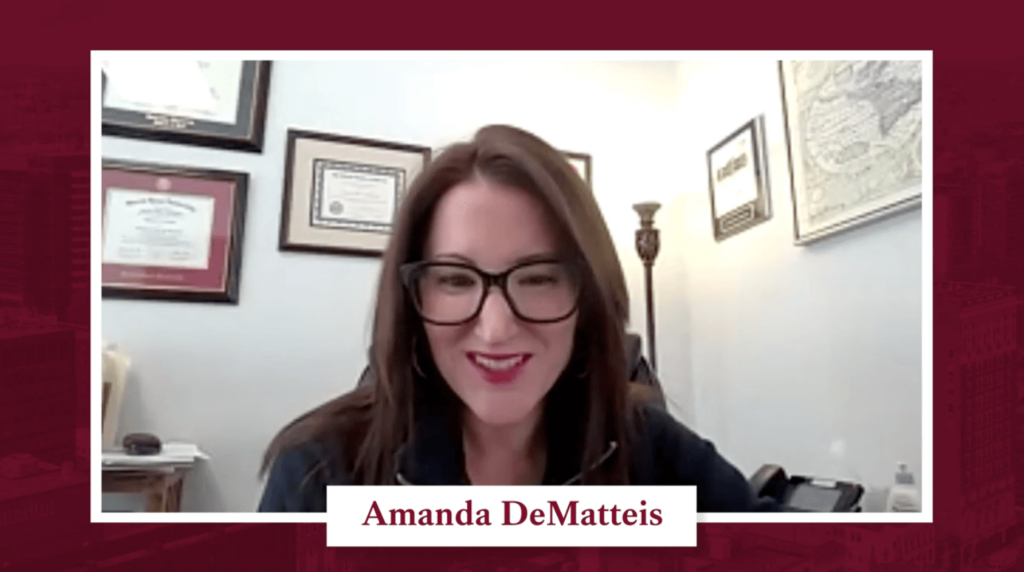Feb 5 2025
Amanda DeMatteis: Hi, Josh.
Josh Goodbaum: Hi, Amanda. What are we talking about today?
DeMatteis: We’ve been talking a bit about the intersection between our Connecticut workers’ compensation laws and the various state and federal disability laws that protect employees at work – both here in Connecticut and across the country. We have another video that we did a little while back, which discusses how disability laws apply to employees who are injured at work.
But I wanted to focus on something much more specific today, which is: Say you’ve suffered from a work injury. That work injury is accepted by the Workers’ Compensation Commission, meaning it’s compensable, but you’re not quite ready to get back to work, and maybe you need light duty.
Light duty could mean a lot of different things. Maybe it’s a standing restriction. Maybe it’s a lifting restriction. Maybe it’s a time restriction, meaning you can only work X number of hours per week. Are you entitled to light duty work under either our Connecticut workers’ compensation statutes or any of our state or federal laws that protect disabled employees at work?
Goodbaum: The answer is yes, Amanda, but I want to explain the thought process on this.
As you know, there is an overlapping system of federal and state laws in this country, and both of them protect workers. There are federal laws that protect workers and state laws that protect workers. The federal system has a law called the Americans with Disabilities Act that requires employers to provide a reasonable accommodation for disabilities, and many but not all workers’ compensation injuries will qualify as disabilities. (Pretty much everything that’s going to knock anybody out of work for any significant period of time would qualify as a disability.)
Under the Americans with Disabilities Act, and likely under our state law counterpart, employers only have to provide a reasonable accommodation if it allows the employee to do the essential functions of their job. In other words, it is not a reasonable accommodation to say, “I want a different job. I want different job duties.” That is not going to be a viable claim or a viable option under our disability laws.
So, then it becomes a question of what state do you live in and what state laws protect you, because the workers’ compensation system is a state-specific system. Every state’s got their own system; they all look similar but not the same. Here in Connecticut, we have Statute 31-313. And that is a statute that provides, essentially, for light-duty work under some circumstances for Connecticut employees if they are out on workers’ compensation.
So, if you have not yet reached maximum medical improvement in the eyes of your doctor or the workers’ compensation judge, your employer has an obligation to transfer you to full-time work suitable for your physical condition, if such work is available. So, then we ask: is light-duty work available in your job? If it is, your employer has an obligation to transfer you to it. But they do not, under most circumstances, have an obligation to create a light-duty job just for you.
Now, keep in mind, if they’ve created light-duty jobs for other people – people who, say, were not hurt at work or have not filed a workers’ compensation claim or are not represented by a lawyer in the workers’ compensation system – that might be workers’ compensation retaliation, in which case you would have a claim under 31-290A.
But to answer your question, “Do you have a right to light-duty work if you have an accepted claim in the workers’ compensation system,” the answer, most of the time, is yes under section 31-313 of the Connecticut General Statutes.
DeMatteis: Really helpful information. Thank you so much, and we hope that’s helpful to Connecticut employees who have suffered from a work injury.
Thanks so much for watching.
Posted by Garrison, Levin-Epstein, Fitzgerald & Pirrotti, P.C. in Commentary
Tagged Amanda DeMatteis, Joshua Goodbaum









